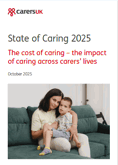State of Caring survey 2025
The State of Caring is the UK’s most comprehensive regular research into the lives and experiences of unpaid carers. It is used as a vital source of evidence not only by Carers UK, but by many other organisations including Government, local authorities, health and social care services, charities and carers groups.
The State of Caring 2025 survey closed in August. Thank you to everyone who took part. We have released two reports following this survey, with more to follow over in the coming months.
- State of Caring: The cost of caring - the impact across carers' lives
- A fresh approach to supporting unpaid carers - Our vision for delivering the NHS 10 Year Health Plan in England.
Read our previous State of Caring reports:
Following the State of Caring 2024 survey we published the following suite of reports:
- The impact of caring on finances
- The impact of caring on employment
- "I want to see a future for carers where..."
- Mental health and social care
Our annual reports for the earlier years are available here:
2023 | 2022 | 2021 | 2019 | 2018 | 2017
In 2020, we replaced State of Caring with two reports looking at the impact of the pandemic on carers' lives, published in April and October 2020.


